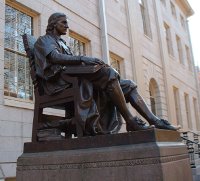Which U.S. university stands for "Truth for Christ and the Church?"
 It must be one of the top seminaries ... Dallas Theological Seminary or perhaps Moody Bible Institute.
It must be one of the top seminaries ... Dallas Theological Seminary or perhaps Moody Bible Institute.Would you believe Harvard University? At least, that's the motto it was founded on when the school began in 1636. That remained as the guiding principle for the now liberal, "free thinking" university until the later half of the 19th century, when then president Charles W. Eliot began the process of stripping away Harvard's moral foundation rooted in Christianity.
Today, the original Latin "Veritas pro Christo et Ecclesia" (Truth for Christ and Church) has been tightened to simply ... Veritas, or Truth. What that truth is based on? Well ... who knows.
In a recent book titled "Excellence Without a Soul," University of Massachusetts instructor Harry Lewis asserts that universities have "lost, indeed willingly surrendered, its moral authority to shape the souls of its students." He goes on to say: "Harvard articulates no ideals of what it means to be a good person."
For Harvard's first 250 years, its biblical basis would have made it clear what its moral foundation was. But now that that's gone, it shouldn't be surprising that the university is floundering when it comes to helping shape the character of its students.
As a part of its foundational mission today, the university states it, "must provide a broad introduction to the knowledge needed in an increasingly global and connected, yet simultaneously diverse and fragmented world." Huh?
Lewis' book, which was recently profiled in the Wall Street Journal, notes that the school never actually says what kind of knowledge is needed.
One can't help but wonder if hearkening back to the core principles the university was founded on might be a good start. By the way, the photo at the top is of a statue of John Harvard, who has his hand upon ... the bible.

0 Comments:
Post a Comment
<< Home